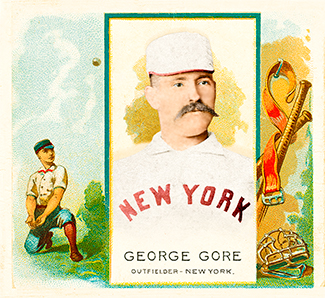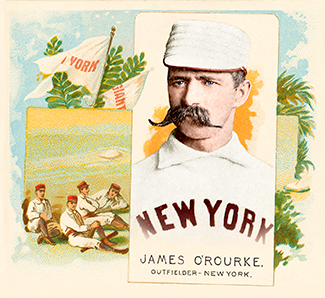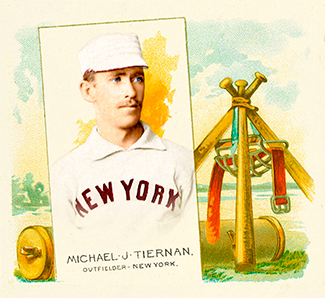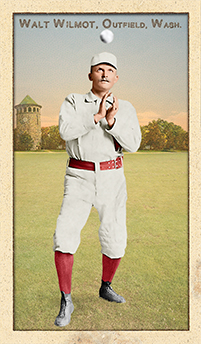
- Series: Beginnings: 1880's
- City: Washington, D.C.
- Team: Nationals
- League: National League
Walter Robert Wilmot (1865-1929) was a switch-hitting outfielder who played for three teams over a ten-season major league career. The high-point of his tenure came in 1894, a wondrous year for hitters in general. The second season after the mound moved to 60' 6'' saw output the likes of which have not been seen before or since. Wilmot far exceeded his normal average, hits and RBI and scored 136 runs - a total that would have placed him in the NL's top-ten any other year of the decade and beyond. But the likes of Hugh Duffy, Billy Hamilton, Joe Kelley and Wee Willie Keeler were setting baseball's world on fire.
That year Hamilton's Phillies fielded the strongest-hitting outfield of all-time, averaging over .400 with sub Tuck Turner exceeding even Billy, Ed Delahanty and Sam Thompson. So where did the mighty slugging Phil's wind up? In fourth place trailing the legendary Orioles by 18 games. But it was in runs-scored that '94 stood out. In most years of the era, one or two teams might barely plate a thousand runners. But in 1894 five teams blew past that mark and four others nearly hit it. Overall, the National League squads averaged an all-time high 7.36 runs per game.
All of this left Wilmot with an outstanding also-ran year for the ages, batting .330 with 197 hits, 134 runs and 130 RBI in just 133 games. Walt broke in with Washington in 1888, spent the first half of the nineties in Chicago and wrapped up with the Giants in 1897-98. He led the NL in triples in '89 and the following campaign tied for the HR lead.
- Wilmot was the first batter to walk six times in a game (8.22.1891)
- He played beside Dummy Hoy in D.C.'s outfield
- In addition to his decade in the majors, Walt played eight minor league seasons beginning with St. Paul in 1886 and ending in Butte, MT of the Pacific National League in 1904
- His MLB stats include a .276 average with 92 triples
- Wilmot’s uniform color on this card was changed in July, 2017 from blue to red to reflect recent reliable research by Craig Brown & friends at Threads of Our Game. One card was previously released featuring a blue uniform.
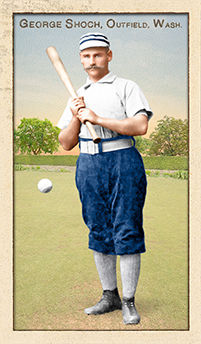
- Series: Beginnings: 1880's
- City: Washington, D.C.
- Team: Nationals
- League: National League
George Quintus Shoch (1859-1937) had a decade-long career in the majors, beginning in 1886 with the Washington Nationals and ending in 1897 with the Brooklyn Bridegrooms. He compiled a respectable career average of .265. George was a valuable utility man, playing outfield, short and 2nd. He demonstrated good plate discipline, striking out only 129 times in 2,924 plate appearances. George's best year was his first in Brooklyn, 1894, where he hit .317 and struck out a mere six times in 65 games. At the close of his big league tenure, Shoch showed his usual consistency, playing in 85 games for the Bridegrooms and hitting .278. Durability and consistency were hallmarks of Shoch's career.
George began pro ball in 1885 with the Eastern League's Wilmington Blue Hens, who also played in Atlantic City, and with the Hartford Babies of the Southern New England League. He remained in the game until age 46, closing out with Binghamton and Amsterdam of the New York State League. Shoch’s last games were with the tri-city team of Amsterdam/Gloversville/Johnstown where the Jags shared their talents for three seasons in three upstate NY towns.
- For one season, 1900, George was player-manager for the Philadelphia Athletics/Harrisburg Ponies of the Atlantic League
- Henry Chadwick wrote that Shoch was “the most versatile utility man the Brooklyn club has ever had”
- Shoch's uniform color on this card was changed in July, 2017 from black to blue to reflect recent reliable research by Craig Brown & friends at Threads of Our Game. One card had been previously released featuring a black uniform.
- Series: 1888 Champion New York Giants
- City: New York
- Team: Giants
- League: National League
“Piano Legs” (1857-1933). An outfielder for 4 teams over 14 major league seasons, Gore was an excellent hitter who played on 7 pennant winning teams and in 4 World Series. His alcoholism oftentimes put him at odds with teammates, fans, and managers.
- All-time leader in OF errors: 368
- Stole 7 bases in 1 game; a record
- Had 5 extra-base hits in 1 game: a record he achieved by hitting 3 doubles & 2 triples against Old Hoss Radbourn
- Won NL batting title: 1880
- Series: 1888 Champion New York Giants
- City: New York
- Team: Giants
- League: National League
- Hall: National Baseball Hall of Fame
James Henry O’Rourke (1850-1919) made the National League’s first base hit, and went on to a 21-year, Hall of Fame career. From 1876-92, only Cap Anson played in more games or got more hits. After leaving MLB for the minors, O’Rourke returned for his swan song with his pal John McGraw’s Giants, becoming the oldest player (at 54) to play in the NL and to get a hit.
- Played for 5 pennant winners and was NA HR champ in 1874-75
- One of only 29 to play in MLB in four decades
- Entered the HOF as one of the first 19th Century players to do so
- Elected to Hall of Fame: 1945
- Series: 1888 Champion New York Giants
- City: New York
- Team: Giants
- League: National League
Michael Joseph Tiernan (1867-1918) overcame early miscues (a still-MLB-record 5 errors in a game & giving up a 10-run 10th inning in relief) to become a model of stability and decorum for the NY Giants, playing exclusively for them his entire 13-yr career. His bat trumped all else. “Silent Mike” was 4th in 19th Century HRs and batted .311 lifetime.
- Tiernan’s bat was key to the NY triumphs in the ’88-89 “world series”
- His outstanding year in ’91 silenced any animosity felt by returning teammates who had formed the ill-fated Players’ League


